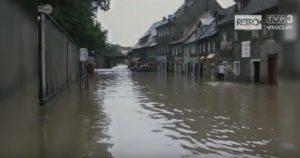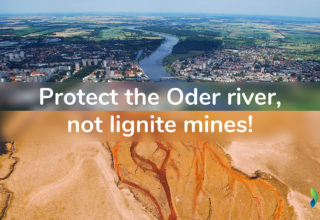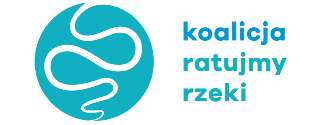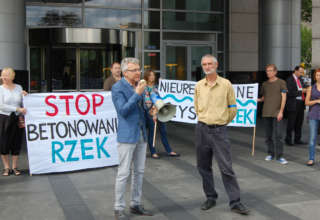
The 18th July 1997 was declared a national day of mourning for victims of the Millenium Flood. On the 21st anniversary of these tragic events we speak about the condition of flood protection in Poland.
Since then, our governments have already obtained three loans from the World Bank for measures aimed at improving security on the Oder. The loans totalled over 10 billion PLN. The money is spent without in-depth reflections, houses are built at floodplains, natural retention is being damaged, and a significant portion of technical measures increase the risk.
These facts have been confirmed at the conference held in Słubice on the 20th June this year. There, two independent reports [1,2] were discussed, both concerning the Project of Flood Protection in the Oder and Vistula Basins. The reports question assumptions and results of flood protection measures provided for in the project. Experts’ critical opinion concerned two measures: reconstruction of Międzyodrze polder and river engineering on the Oder by construction and modernisation of groins on the Border Oder. The authors highlighted gross miscalculations.
It has been shown that reconstruction of Międzyodrze polder from a natural one into what is called a steered polder along with building of levees may actually increase flood risk for people, especially in the case of winter floods. This is not a way to improve flood security in Szczecin, a declared purpose of the investment. Meanwhile, Border Oder engineering up to the standard of 3rd-class waterway on the pretext of improved operation of ice-breakers has hardly anything to do with flood protection. On the contrary, construction or reconstruction of the groins increases the risk by causing accumulation of waters above the investments.
Questioning the concept of engineering on the Oder, the experts indicated that there is no evidence of any problems related to river depth in operations of icebreakers and that there are alternative solutions to solve ice blockage – e.g. amphibian icebreakers of only small portion submerged in the water, tested in Canada. “It looks like we’ve taken billion-worth loans to adapt rivers for icebreakers instead of adapting icebreaking methods to conditions on the river. Cost of a single amphibian is about one million PLN, which means that purchasing even a dozen such amphibians to complement operations of regular icebreakers is still economically incomparable to the other solution. “It is a way to use public resources to build a waterway rather that to actually improve flood protection – argues Paweł Pomian of EKO-UNIA, member organisation of ‘Save the Rivers’ Coalition. The published reports confirmed also that engineering works on the Oder without relevant reflection pose a threat to the entire chain of protected areas along the Oder value, a continuous sequence from Malczyce to Szczecin. [3]
Radosław Gawlik of EKO-UNIA and ‘Save the Rivers’ Coalition (KRR) says: “This is a confirmation of environment researchers’ fears that the investment will threaten people living close to the Oder, as well as animal species and habitats on all Nature 2000 areas where works on the Oder are planned, from Nowa Sól to Szczecin. Reports have been released, we hope the program will be changed. We can’t accept the fact that the EU is co-funding and supporting this project.
The World Bank’s Project Coordination Director explains that the operations are transparent, considering all strict procedures of the Bank and all objections will be taken into account, while the published reports will be analysed. Despite these declarations some measures which have been evaluated as negative are already quite advanced, awaiting environmental impact decisions, not far from construction permits.
“The project refers to displacements, flood protection, but we perceive insufficient communication with parties which implement particular measures. There is very little chance for the society to hold consultations concerning particular elements, the project is written in a complicated manner, consultations are organised during holidays or around festivals, there is insufficient visual identification and information. In these circumstances, it is difficult to speak about an open dialogue with the society or consideration of the society’s opinion” – explains Ewa Leś, KRR coordinator. She adds: “Our experience and observations belie the other party’s declarations”.
Dr Joanna Kubicka, collaborator of EKO-UNIA and economist employed at the University of Business in Wrocław: “The lack of transparency in the government and World Bank’s decision making concerning the scope of the project is outragous. There are no justifications, no analyses of alternative solutions or precise outcome indicators. The project is expected to cost almost 4.8 billion PLN funded with public resources and the World Bank’s loan3, so we want to be absolutely certain that the money is spent only on sustainable solutions, optimal for people and the natural environment. This is especially important in view of Poland’s growing drought issues”.
References:
1) Report: “Effectiveness of the planned Międzyodrze detention basin and the concept of watercourse regulation in the context of flood protection improvement at the Lower Oder” http://www.ratujmyrzeki.pl/185-przyjazna-ludziom-i-przyrodzie-ochrona-przeciwpowodziowa-obszaru-zlewni-rzeki-odry-ze-szczegolnym-uwzglednieniem-regionu-doliny-dolnej-odry
2) Report: “Identification of key areas for water detention in the Polish part of the Oder basin. Analysis of potential water retention in irrigation systems and its potential impact on reduction of low winter flow.” http://www.ratujmyrzeki.pl/185-przyjazna-ludziom-i-przyrodzie-ochrona-przeciwpowodziowa-obszaru-zlewni-rzeki-odry-ze-szczegolnym-uwzglednieniem-regionu-doliny-dolnej-odry
3) http://www.kp.org.pl/pdf/stanowiska/wodne/2016-09_ryzyko_oddz_proj_bs_odra_wisla_na_przyrode_201609.pdf
4) TOK FM broadcast http://audycje.tokfm.pl/podcast/Czy-dalsza-regulacja-Odry-jest-potrzebna/64412




